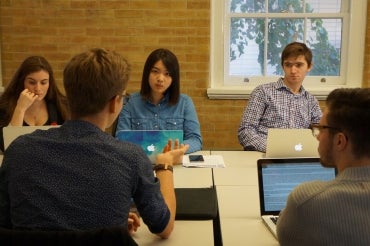Munk One competition offers mentorship to new U of T students

Published: November 28, 2016
If you were given just 24 hours to come up with a proposed solution to sex trafficking in Toronto, would you be up to the task?
Students in the Munk One program at U of T's Munk School of Global Affairs were challenged to do just that at the program’s annual case competition earlier this month.
“At first it was extremely daunting,” said Jonah Toth, a Munk One student and contest participant. “We came in not knowing what the topic was and not knowing anything about sex trafficking. It was an intensive process.”
Munk One is one of several first-year foundation programs at U of T that are designed for small groups – no more than 25 students – mixing lectures with seminars, labs and group exercises. The Munk One case competition is a precursor to Munk One Dragon’s Den competition in the spring.
In the mentorship phase of this year’s case competition, groups received insight from experts such as CTV crime reporter Tamara Cherry and Lisa DiFederico, a human trafficking advocate at Covenant House Toronto. The purpose of the mentorship phase is for students to learn how to research and refine their big ideas before tackling possible solutions.
After the full day of mentorship from experts and former Munk One students, competitors split into groups. They had 24 hours to brainstorm potential solutions to real problems in Toronto.
“At first, it seemed like an insurmountable task, but we had some really good help from our student mentor,” said Uma Kalkar, a first-year life sciences student. “She helped us break down the issue and figure out what population to target. We were able to look at sex trafficking from different viewpoints and figure out which approach to take with our resources and expertise.”
Kalkar’s group also received mentorship from Cherry, whose reported on domestic sex trafficking. She told students to be as realistic as possible with their ideas.
“She encouraged us to actually reach out to groups, send e-mails, create a budget and think about ways to make our project feasible,” said Kalkar.
On competition day, student groups gathered to brainstorm, fine-tune and present their ideas. This year, a group of grade 12 students from Michael Power-St. Joseph High School joined the Munk One teams.
“The case competition is a rare opportunity to bring three sets of students together: seniors in high school, as well as first and second year undergraduates in university,” said Teresa Kramarz, director of the Munk One program and an assistant professor in the Faculty of Arts & Science. “High school students work alongside our first year students in research groups, and our second year students do all the research required to prepare a case guide. We put in practice the medical teaching tradition where students are asked to ‘see one, do one, teach one.’”
At the end of the competition, students presented their ideas to a panel of judges which included Toronto Police Detective Constable Jason Davis, assigned to the human trafficking enforcement team, Michele Anderson, who works at Covenant House Toronto with young survivors of human trafficking, Rosemary Gartner, a professor of criminology at U of T, and Antonela Arhin, a sessional lecturer at U of T who teaches courses on human trafficking and is the executive officer of the Centre for Diaspora and Transnational Studies. The presentations were an opportunity for students to receive further advice and feedback from experts in the field.
“There is only so much you can read about an issue. At some point when exploring academic literature, you hit a wall and it helps having a professional share their personal experience,” said Toth. “It’s an excellent opportunity to practice for what’s going to come up later in the course.”
The smallest of U of T’s first year foundation programs, Munk One teaches students to tackle global challenges and provides tools to help them put big ideas into practice. Many Munk One students go on to implement their ideas, like Munk One alumni Adam Sheikh, now a 19-year-old peace, conflict and justice student at the Munk School of Global Affairs who launched a work safety intervention in the Gulf region and Munk One alumni Quinn Underwood, who helped develop a mobile app that addresses food insecurity on university campuses.
Read more about Sheikh's cooling vests for workers in Qatar
“The case competition highlights the tremendous potential among young students who are eager to tackle some of the world’s most intractable problems,” said Kramarz. “It is always remarkable to me to see their eagerness and commitment to really understand the issue and then come up with a feasible intervention.”
Read more about Munk One

Judges for the event included (from left to right) Covenant House's Michele Anderson, Rosemary Gartner, a professor of criminology at U of T, Antonela Arhin, a sessional lecturer at U of T and Toronto Police Detective Constable Jason Davis (photo courtesy of Antonela Arhin)



